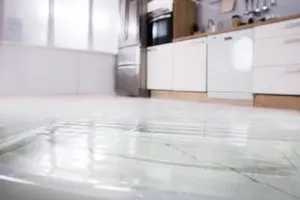
Flooding from heavy rains can do more than invade your home. The flood waters can also damage parts of your plumbing system, but there are ways to repair the damage and prevent it from occurring again.
1. Line Incursion
Flooding can overwhelm the municipal sewer system or even a private septic system. When flood waters invade these systems, the overflow needs somewhere to go.
Concerns
When sewage systems become overwhelmed with flood waters, the water may encroach into the sewer lines that are connected to your home. The result is a backup of sewer and flood waters into the home — typically through floor drains but occasionally toilets and sinks will also overflow. Not only will the water incursion cause flood damage, the sewage is a health hazard.
Options
There is little you can do other than cleanup once the damage occurs, but your plumber can prevent sewage backups in the future. Your plumber will install a back water valve on your main line, which will activate a sewer cutoff valve in the event effluent begins to back up in the sewage line from the municipal sewer.
2. Blocked Drains
Many homes are equipped with exterior drain systems, particularly those where flooding is common. These drains can become blocked with leaves and other debris, which may lead to problems.
Concerns
Debris in exterior drains can lead to flooding around the yard. In some cases, flood waters may collect against the home’s foundation and leak into the house. Flooding from blocked drains can also saturate soils, which can lead to soil movement and water line damages.
Options
The best option is prevention. Your plumber can clean exterior drains using the same methods that are effective for interior drains. When having your drains serviced each year, ask your plumber to include any exterior drains in the work.
3. Sump Overloads
Many homes with basements and crawl spaces are equipped with a sump pump and pit drainage system. In minor floods, these systems can work well to keep the water out of your home. Severe flooding can lead to a system overload, though.
Concerns
Your sump pump is designed to move a certain amount of gallons per hour (GPH). If the rate of incoming flood waters is greater than the pump’s GPH, then the sump pit will become overwhelmed with water and your basement will begin to flood.
Options
If flooding of this level is expected to be the new norm, then you may need to have your plumber install a new pump with a greater GPH rating. Regular servicing of the pump is also necessary, particularly if it is not used frequently. Your plumber can service the pump annually and show you how to perform basic cleaning and testing on a monthly basis.
4. Shifting Soils
Certain types of soils are prone to shifting when they are saturated due to flood conditions. Water and septic lines that route through these shifting soils can be at risk for damages.
Concerns
Expansive clay soils are very prone to movement when they are absorbing flood waters. Saturation actually causes the soil to expand and shift, which puts undue pressure on the sewer line and main water supply line. The pressure can cause lines to break, leading to a water leak or sewage leak in your yard.
Options
Regular line inspections are your best guard against breakage from flooded soil shifting. Your plumber can use a camera to check lines for small cracks and damages that will make them less resilient to soil movement, and then recommend repair options for the specific problem. If you have older lines that are less resilient to damage, replacement may be recommended.
Contact Spartan Plumbing Services if you are concerned about flooding and your plumbing system.
